Envision a life where you are the master of your own energy, harnessing the natural forces of the sun and the wind to fuel your daily existence. This is the promise of off-grid living, and Heating, Ventilation, and Air Conditioning (HVAC) systems are a critical part of this lifestyle.
Off-grid HVAC systems are gaining popularity as they provide heating, cooling, and ventilation without the need for traditional utility services, offering a sustainable and self-sufficient method of climate control. Despite some challenges such as the initial investment and necessary lifestyle changes, the rewards are significant. Not only can off-grid HVAC systems save you money in the long run, but they also provide a sense of self-sufficiency and connection with the natural world.
- Off-grid HVAC systems provide a practical and sustainable way to heat and cool your home.
- They foster a sense of self-sufficiency and connection with the natural world.
- Solar-powered HVAC systems are particularly efficient and affordable.
- Living off-grid requires a change in lifestyle and mindset, as you must become more aware of your energy usage and make adjustments accordingly.
- Despite some challenges, off-grid living can save you money in the long run and represent a significant step towards a more sustainable future.
Off-grid HVAC Systems: An Overview
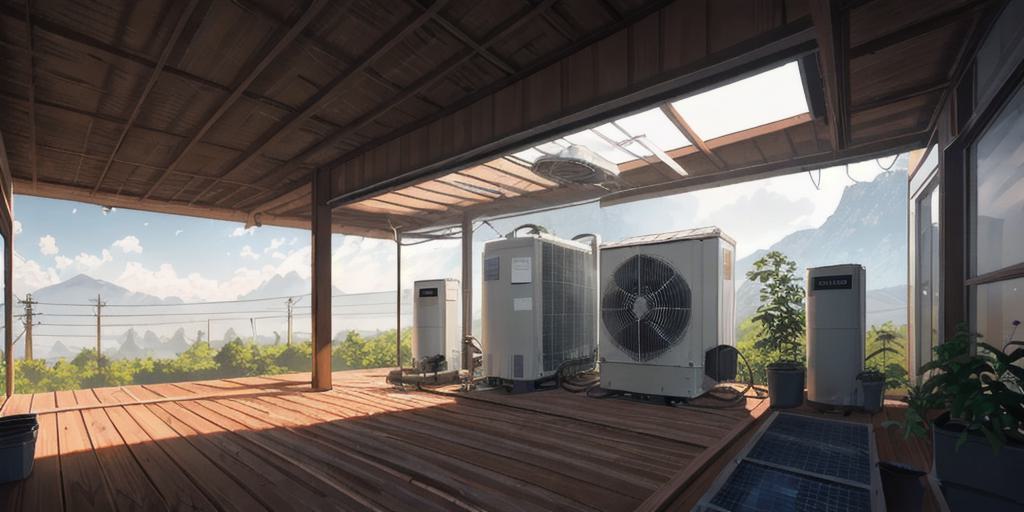
Embracing the Off-grid Lifestyle: The Power of HVAC
Imagine a life where you’re the master of your own energy, harnessing the power of the sun and the wind to fuel your daily existence. No more utility bills, no more reliance on the grid, and no more guilt about your carbon footprint. This is the promise of off-grid living, and Heating, Ventilation, and Air Conditioning (HVAC) systems are a key component of this lifestyle.
The Rising Popularity of Off-grid HVAC Systems
More than ever, individuals are seeking to break free from the 9-5 grind, to live closer to nature, and to reduce their impact on the environment. Off-grid HVAC systems are becoming increasingly popular in this context. These systems provide heating, cooling, and ventilation without the need for traditional utility services, offering a sustainable and self-sufficient method of climate control.
Among the various off-the-grid options available, solar-powered HVAC systems stand out due to their efficiency and affordability. The system works by harnessing the power of the sun to heat or cool a home, requiring minimal maintenance and offering significant long-term savings. In fact, the HVDC transmission technology has emerged as an economically viable solution for long-distance power transmission, contributing to the increasing appeal of solar-powered HVACs.
Overcoming the Challenges of Off-grid HVAC
While the benefits of off-grid HVAC systems are clear, there are challenges involved in setting up and maintaining these systems. The initial investment can be significant, and the systems must be designed and installed correctly to ensure optimal performance. Moreover, off-grid living requires a change in lifestyle and mindset, as you must become more aware of your energy usage and make adjustments accordingly.
Despite these challenges, the rewards are significant. Not only can off-grid HVAC systems save you money in the long run, but they can also provide a sense of self-sufficiency and connection with the natural world. They represent a tangible step towards a more sustainable future, and they empower individuals to take control of their own energy needs.
So, if you’re interested in escaping the rat race, living closer to nature, and reducing your environmental footprint, then off-grid HVAC systems could be the perfect solution. They offer a practical and sustainable way to heat and cool your home, and they represent a significant step towards a more self-sufficient lifestyle.
Benefits of Off-grid HVAC for Homes and Businesses
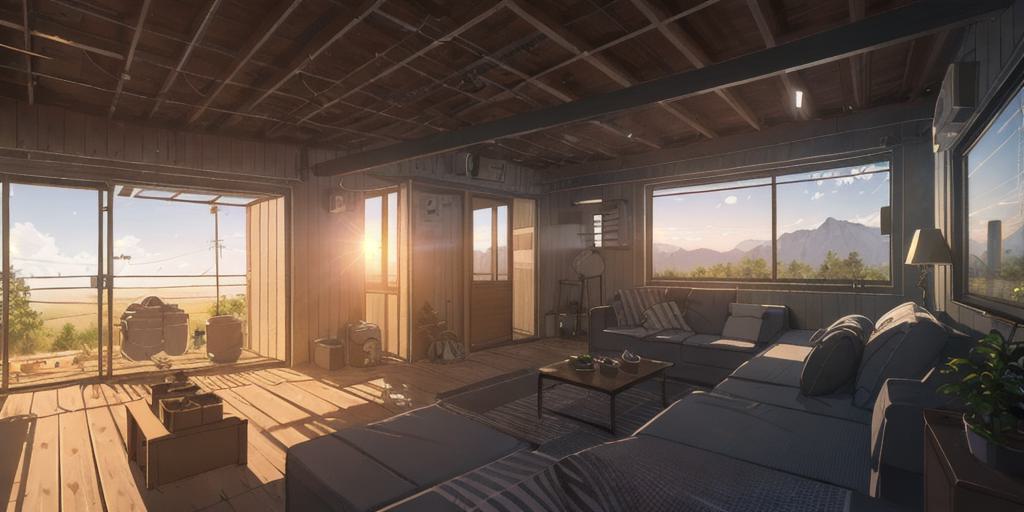
Innovative Off-Grid HVAC: Ice Storage Air-Conditioning
As we continue to unwrap the possibilities presented by off-grid HVAC systems, technology is a step ahead, introducing innovative solutions like ice storage air-conditioning. This remarkable system uses ice to store thermal energy, which is then employed to cool buildings during periods of high demand. The concept isn’t new, but recent advancements have made it more efficient and cost-effective, revolutionizing the HVAC industry. This breakthrough technology significantly diminishes energy consumption, making ice storage air-conditioning a compelling choice for off-grid entrepreneurs and homesteaders. Take a moment to delve into the revolutionary world of ice storage air-conditioning.
Smart Systems: The Future of Energy Efficiency
With the constant evolution of technology, the future presents smart systems as a solution for energy efficiency. These systems use cutting-edge technology such as AI, IoT, and data analytics to optimize energy use and minimize waste. Whether it’s real-time monitoring and management of energy consumption or the use of energy-efficient appliances, smart systems are the cornerstone of a sustainable future. They help homeowners understand their energy usage, identify inefficiencies, and implement targeted cost-reduction strategies. This smart technology is not just an investment for the present, but a step towards a sustainable, efficient future.
Building Resilience: Offshore Wind Energy Integration
As we strive to create a self-sufficient lifestyle, the integration of renewable energy sources into our lives is paramount. Offshore wind energy is one such promising source. With the U.S. Department of Energy’s (DOE’s) National Renewable Energy Laboratory (NREL) developing technologies to integrate offshore wind installations into the grid, the future of energy is set for a significant shift. This integration is expected to deliver power efficiently and affordably from offshore plants, providing substantial benefits to the power grid, industry stakeholders, and the environment. So, as we embrace off-grid living, let’s not forget to ride the wave of offshore wind energy.
Types of Off-grid HVAC Systems
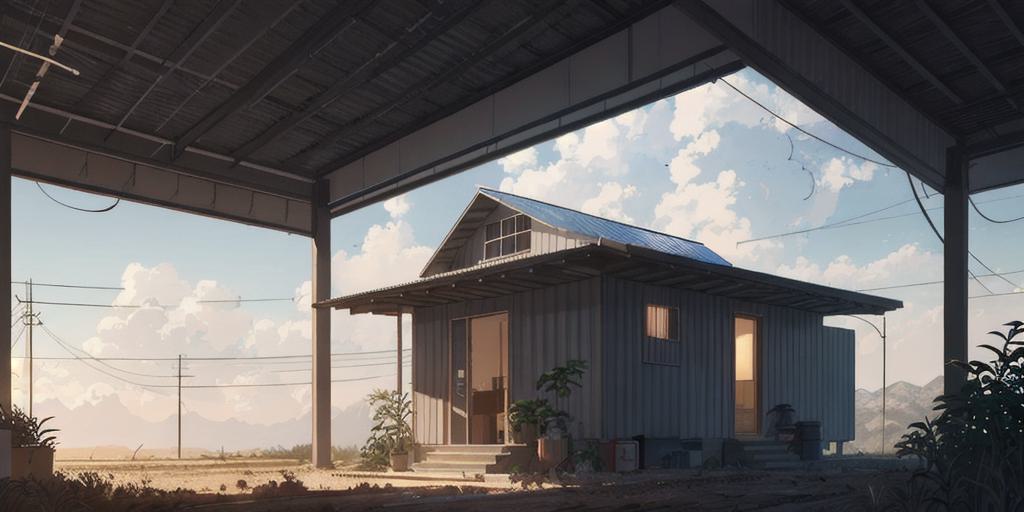
The Evolution of HVAC Control Systems
As we delve deeper into the realm of off-grid HVAC systems, it becomes clear that control systems have evolved significantly over the years. These systems, which intricate multiple components for optimal ease of use, have morphed from simple mechanical devices into AI-empowered, mobile-friendly interfaces that can learn the unique heating characteristics of your building. This is not just about maximizing energy savings, but also about improving the quality of life for those who manage and operate these systems. Imagine the convenience of diagnosing system faults from your cell phone or the ability to reduce capacity during off-peak hours. This innovation in HVAC control systems is a testament to the boundless potential of technology in the realm of HVAC.
The Power of Off-Grid Inverters
In the pursuit of self-sufficient living, off-grid inverters have emerged as a key player. From the first off-grid inverter created in Jacksonville in 2007 to the innovative devices of today, this technology has revolutionized the way we generate and consume electricity. Today’s off-grid inverters cater to a range of needs – from lighting to cooling needs, and can work in harmony with solar panels or diesel generators to power local businesses and homes. With a variety of off-grid inverters available, you can choose one that best fits your location, budget, and lifestyle. Discover the fascinating story of the first off-grid inverter in Jacksonville.
The Role of Off-Grid Batteries
Off-grid batteries, though shrouded in mystery, play a pivotal role in any off-grid HVAC system. Whether it’s lead-acid batteries that date back to the early 90s or the modern lithium-ion batteries, each type brings a unique set of advantages and challenges to the table. These batteries, while not subject to traditional regulatory norms, carry the potential to power your off-grid lifestyle efficiently. Explore the intriguing history of off-grid batteries and their role in the evolution of off-grid living.
Designing an Off-grid HVAC System for Your Home or Business
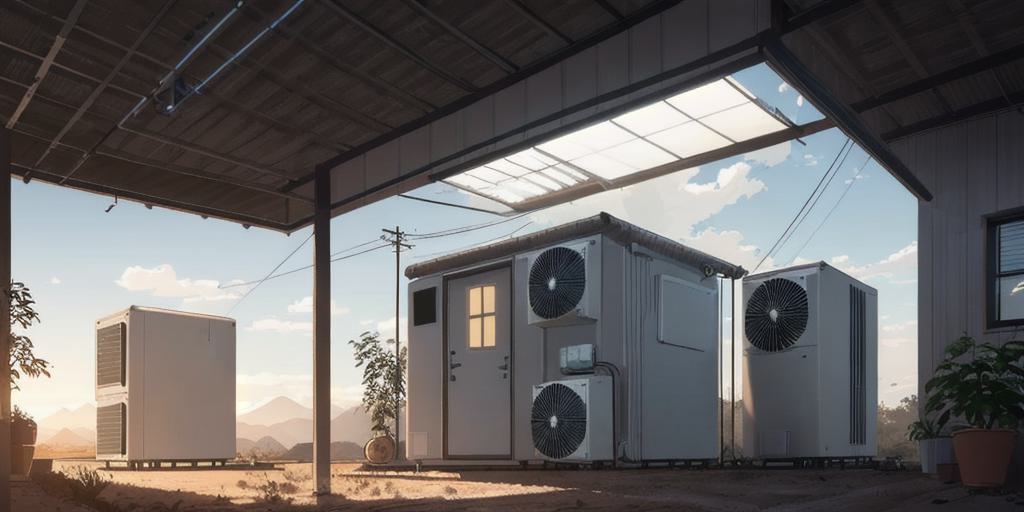
Understanding the Off-grid HVAC Ecosystem
Before you dive into designing your off-grid HVAC system, it’s crucial to understand the ecosystem you’re stepping into. Much like the designing of an electric vehicle, creating your off-grid HVAC system requires a certain level of freedom and creativity along with a deep understanding of its mechanics.
When we talk about off-grid HVAC systems, we’re essentially referring to a system that operates outside of the conventional power grid, typically powered by renewable energy sources like solar or wind. The choice of going off-grid is not merely about saving some bucks on your electricity bill, it’s a lifestyle choice, a commitment to sustainable living, and an expression of your independence.
Embracing the ‘Anti-Grid’ Approach
Just like the flexibility offered by the design of an electric vehicle, creating your off-grid HVAC system provides an opportunity to approach your energy needs in a more personalized and efficient way. The key is to embrace what Jeff Hammoud, Head of Design for Rivian, called an ‘anti-grid’ approach.
With an off-grid HVAC system, you’re not just a passive consumer of energy but an active participant in its creation and management. This shift calls for a radical rethinking of how we understand and interact with our energy systems. Much like the Industrial Internet of Things (IIoT), the off-grid HVAC system is a blend of technology and human interaction, with a strong emphasis on efficiency, sustainability, and adaptability.
Designing Your Off-Grid HVAC System
When designing your off-grid HVAC system, your objective is to create a system that efficiently meets your heating and cooling needs while being powered by your chosen off-grid energy source. The system should be resilient, capable of handling fluctuations in energy production, and adaptable to changes in your energy needs.
To achieve this, you will need to consider several factors such as the size and insulation of your home or business, the local climate, and your specific heating and cooling needs. The mounting brackets for your solar panels, the capacity of your off-grid batteries, and the efficiency of your inverters are all part of this puzzle.
Designing your off-grid HVAC system is not a one-size-fits-all endeavor. It’s a journey of exploration and experimentation, much like the process of personal growth and self-discovery. It’s about stepping out of your comfort zone, challenging the status quo, and creating an energy system that aligns with your values and lifestyle.
Components of an Off-grid HVAC System
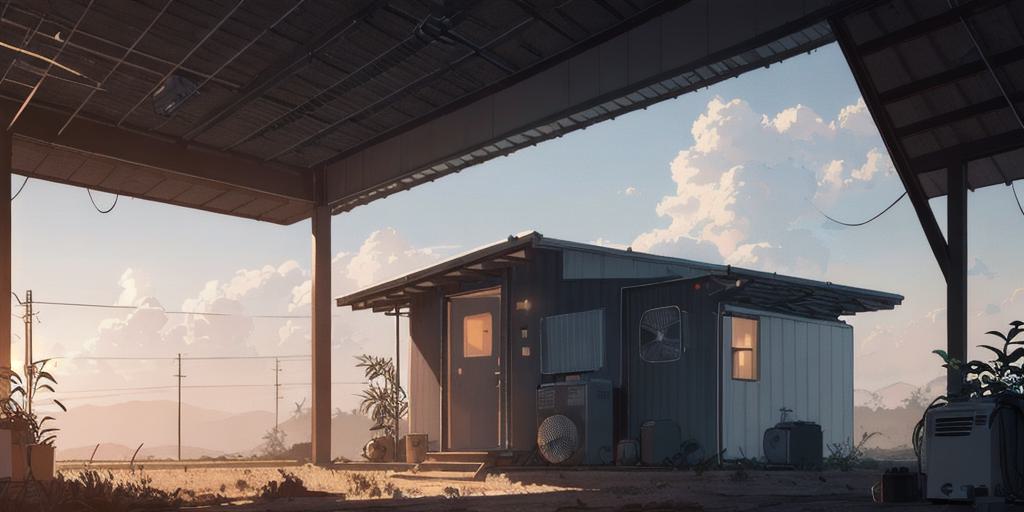
The Art of Selection: Choosing the Core Components
Designing your off-grid HVAC system is akin to painting a masterpiece. You start with an empty canvas and a palette of options. The brushes and paints you select are your choices of HVAC components. Let’s explore the core components that will make up your off-grid HVAC system.
The heart of your off-grid HVAC system will be the energy source. Solar panels, wind turbines, or a combination of the two will fuel your system. The choice should be based on your local climate and the availability of these resources. Remember, the size and efficiency of your renewable energy source will greatly influence your system’s overall effectiveness.
Next, an inverter is essential to convert the energy harvested from your solar panels or wind turbines into a form suitable for household use. The capacity of your inverter should match the energy production of your renewable source. In addition, the efficiency of your inverter will play a crucial role in determining the overall efficiency of your off-grid HVAC system.
Finally, the battery system will store excess energy generated during times of high production, providing a backup for periods of low production or high demand. Here too, efficiency and capacity are key considerations. The choice of battery type will also affect the overall lifespan and maintenance cost of your system.
Installation and Validation: Bringing Your System to Life
Once you’ve selected your components, it’s time to bring your system to life. Much like launching a successful internet business or mastering a new skill, the installation process requires careful planning and execution.
Installation Quality (IQ) is a key consideration at this stage. Your system should be installed in accordance with the manufacturer’s recommendations, appropriate codes, and the approved design. The goal of IQ is to verify and document the quality, installation, and integrity of your HVAC system components.
Operational and Performance Qualification (OQ & PQ) are the next steps in the validation process. OQ & PQ tests ensure that your system can consistently operate in accordance with the specifications under routine use. These tests should be rigorously conducted and documented to ensure consistent performance of your system over time.
Adaptation and Optimisation: The Continuous Journey
Finally, remember that designing an off-grid HVAC system is not a one-off task, but a continuous journey of adaptation and optimisation. Just as a seasoned entrepreneur constantly optimises their business strategies, or an athlete continually fine-tunes their training regimen, you should be ready to adapt and optimise your off-grid HVAC system as your energy needs evolve and new technologies emerge.
By embracing the ‘anti-grid’ approach, you’re not just creating an energy-efficient HVAC system. You are crafting a lifestyle that reflects your commitment to sustainability and self-sufficiency. The process might be challenging, but the rewards of a successful off-grid HVAC system are profound. Not only will you enjoy the comfort of a well-regulated indoor climate, but also the satisfaction of knowing that you’re doing your part to reduce our reliance on non-renewable energy resources.
Installation and Maintenance of Off-grid HVAC Systems
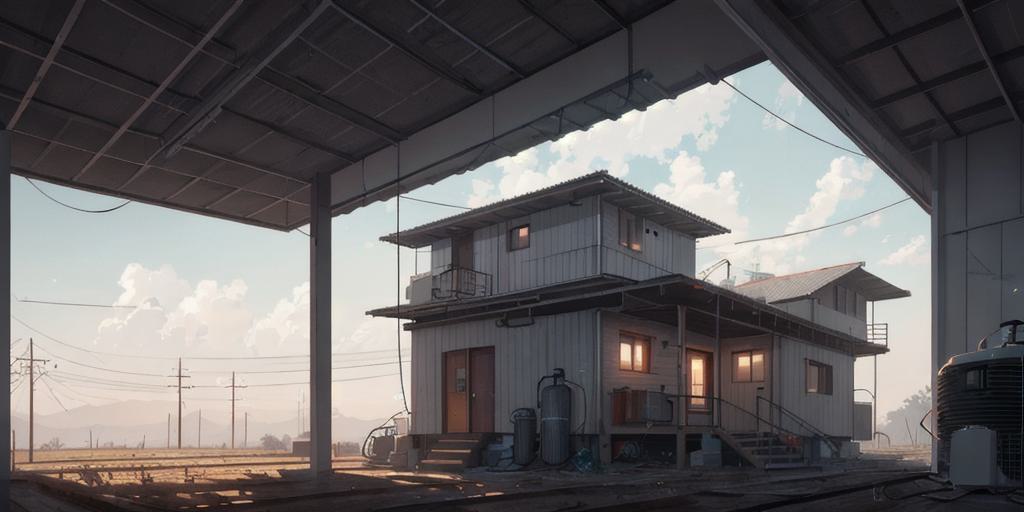
The Symphony of Installation: Making it Work
Imagine setting up your off-grid HVAC system as if you’re orchestrating a symphony. Each instrument plays a vital role, and it’s your job to ensure they’re all in sync. But instead of musical instruments, you’re dealing with solar panels, wind turbines, inverters, batteries and more. It’s an elegant dance of technology and nature.
The art of installation isn’t something to be rushed. As noted by HVAC experts, the quality of installation can make or break your system. So, approach it with the same patience and attention to detail you’d apply when launching an online venture or mastering a new skill.
And remember, you’re not alone in this process. Many have ventured down this path before you, and their stories can serve as your guide. In the words of one off-grid enthusiast, “Installing our HVAC system was like assembling a 3D puzzle. Each piece had its place, and seeing it all come together was incredibly rewarding.”
Preventive Care: The Art of Maintenance
Maintenance is the unsung hero of any successful off-grid HVAC system. It’s the equivalent of the daily practices that keep a top athlete in peak condition, or the fine-tuning that keeps an online business on the cutting edge.
Regular check-ups, timely repairs, and system upgrades are all part of this journey. Implementing a consistent maintenance schedule not only ensures your system’s longevity but also optimizes its performance. As one homeowner put it, “Our off-grid HVAC system isn’t just a set-it-and-forget-it deal. It’s a living, breathing part of our home that we take care of, much like a garden.”
And just as a mindful gardener would seek out the best tools and techniques, don’t hesitate to leverage the wealth of knowledge available online. Learn from the experiences of others and stay abreast of the latest advancements in off-grid HVAC technology.
Embrace the Journey: Continual Adaptation and Learning
Remember, living off the grid isn’t a destination—it’s a journey. And just like any journey worth undertaking, it’s filled with opportunities for growth and learning. As your needs change and new technologies emerge, you’ll continue to adapt and refine your HVAC system.
This ongoing journey of adaptation and learning is a hallmark of the off-grid lifestyle. As one off-grid dweller noted, “Living off the grid has taught us to be adaptable and resourceful. Our HVAC system is a testament to that. It’s always evolving, just like us.”
So, whether you’re a digital nomad seeking a more sustainable lifestyle or a city dweller yearning for a slice of off-grid heaven, remember this: designing, installing, and maintaining your off-grid HVAC system is more than just a task. It’s a tangible expression of your commitment to living in harmony with nature, a testament to your resourcefulness, and a rewarding journey in its own right.
Energy Efficiency of Off-grid HVAC Systems
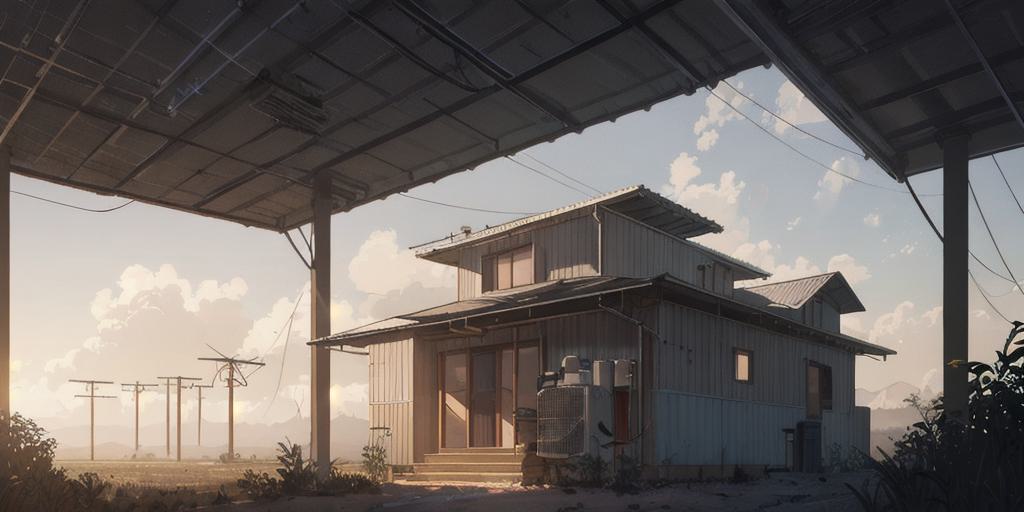
Thriving in the Efficiency Economy
Living off the grid isn’t just a trend; it’s a shift towards an efficiency economy. The Edison Foundation’s Institute for Electric Efficiency reveals a fascinating truth: energy efficiency is still the cheapest ‘fuel’ around, albeit getting more expensive. But the rising costs should not deter us. Instead, we should view it as a challenge, a riddle to solve, much like a marketer optimizing an online campaign or an athlete fine-tuning their performance.
As the low-hanging fruits of efficiency become scarce, we must push our boundaries, innovate and find new ways to conserve energy. In a world where it costs 3.5 cents to save a kilowatt-hour in energy efficiency, every bit of conservation counts, especially in the realm of off-grid HVAC systems.
Reframing the Cost-Value Equation
The notion of cost reduction as a driver for efficiency investments is not new. It’s common sense: if it saves money, it’s good. However, there’s a deeper layer that often goes unnoticed. An analysis of California’s energy efficiency programs brings a new perspective: the long-term impact of these investments on sustainability and the environment.
Just as an online entrepreneur would invest in tools and strategies that yield long-term benefits, the off-grid dweller must focus on long-term sustainability. It’s about reframing the cost-value equation, seeing beyond immediate financial savings, and considering the lasting impact on our planet.
The Power of Smart Integration
Efficiency is a multi-faceted concept. It’s not just about using less; it’s about using smart. This is where the power of integration comes into play. The U.S. Postal Service’s efficiency retrofits offer a shining example. By integrating energy-efficient lighting, software-controlled HVAC systems, solar panels, and fuel cells, they managed to halve the energy usage of a 1.2 million square foot facility.
As off-grid enthusiasts, we can learn from this. By smartly integrating various energy systems – from solar panels to wind turbines to our HVAC system – we can optimize our energy usage and make the most of our off-grid lifestyle.
Comparing Off-grid HVAC to Traditional HVAC Systems
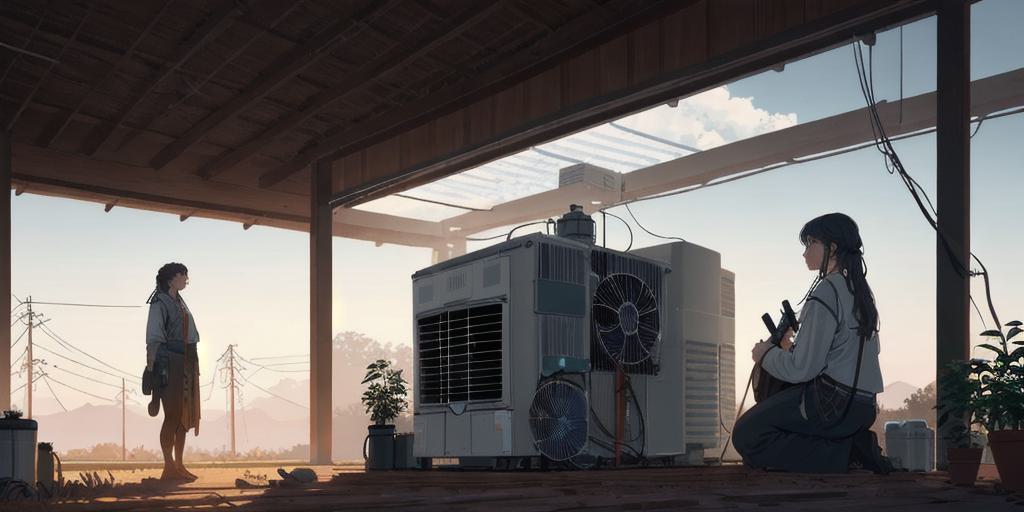
The Art of Choosing: Off-Grid vs. Traditional HVAC Systems
In the ongoing tension between technological progress and sustainable living, making informed choices becomes an art, comparable to an entrepreneur choosing the right tool for his business or a homesteader deciding which crop to grow. One of the most pivotal choices for off-grid living is the type of heating, ventilation, and air conditioning (HVAC) system to use. The decision between off-grid HVAC and traditional HVAC is akin to choosing between two different lifestyles.
Traditional HVAC systems are like the well-trodden path, associated with the ease of conventional living, proven effectiveness and widespread use. Conversely, off-grid HVAC systems, like the path less travelled, require a deeper understanding and willingness to adapt. They embody the principles of autonomy and sustainability, as reflected in this article on HVAC systems.
Understanding the Value of Sustainability
Living off-grid is more than just a change of location. It’s a shift in mindset, a commitment to a more minimalist lifestyle, and a quest for self-reliance. Just as an online business thrives on independence from physical constraints, off-grid living thrives on independence from conventional energy grids.
In a traditional HVAC system, energy efficiency often equates to cost-effectiveness. On the other hand, an off-grid HVAC system is defined by its sustainability, a quality that transcends monetary value. It’s about harnessing renewable energy sources like solar and wind power and reducing our carbon footprint. The value here is not just in money saved, but in the contribution to a healthier planet.
As this article suggests, installing an HVAC-specific solar panel system can harness sunlight for heating and air conditioning purposes, reducing power usage and promoting sustainability.
Embracing the Challenge of Integration
Choosing an off-grid HVAC system is akin to embarking on a new business venture. It requires the integration of various elements, a process that can be challenging but rewarding. For instance, a solar-powered HVAC system necessitates the integration of solar panels, battery storage, and the HVAC unit itself.
It’s a path that demands learning and adaptation, just as an entrepreneur must learn to navigate the online business landscape or a homesteader must learn to cultivate a new plot of land. But in the end, the satisfaction of crafting a personalized, sustainable solution that aligns with one’s lifestyle and values is worth the effort.
It’s this challenge of integration, as illustrated in this story, that makes the journey towards off-grid living so fulfilling. Just as each element of an online business or a homestead works together to create a cohesive whole, each component of an off-grid HVAC system collaborates to provide a comfortable, sustainable living environment.
Off-grid HVAC in Different Climates and Regions

Adapting to the Environment: HVAC for Different Climates
Just as an online entrepreneur adapts his strategies to the digital marketplace, or a homesteader modifies his techniques based on the landscape, an off-grid lifestyle demands a tailored approach to HVAC. Different climates and regions present unique challenges and opportunities when it comes to heating, ventilation, and cooling. As explored in this article, innovative solutions range from swamp cooling for arid landscapes to ice-powered air conditioning for areas with significant temperature fluctuations.
Just as the digital nomad leverages the internet to work from anywhere, the off-grid dweller can leverage the climate to his advantage. For instance, in arid regions where the air is dry, evaporative coolers can be more energy efficient and cost-effective than traditional air conditioning. By harnessing the power of evaporation, these coolers provide a natural cooling method that also improves indoor air quality by circulating fresh outdoor air.
Technological Innovation: Harnessing Renewable Energy
Just as the digital revolution opened new possibilities for entrepreneurs, technological advancements in the field of renewable energy have created exciting opportunities for off-grid living. Solar-powered cooling systems, such as solar-assisted absorption chillers and photovoltaic-powered air conditioners, are game-changers in the world of HVAC, offering a sustainable alternative to grid electricity.
These systems, much like the platforms that facilitate online business, provide a level of energy independence that aligns with the ethos of off-grid living. As described in this article, solar cooling not only reduces greenhouse gas emissions and environmental impact but may also qualify for incentives and tax credits in many regions, making them an economically attractive choice.
Personalizing the Off-Grid Experience: Smart HVAC
In the same way that an online entrepreneur personalizes his services to meet the needs of his clientele, off-grid dwellers can personalize their HVAC systems to meet their specific needs. Advances in technology have given rise to smart thermostats, which can learn your cooling preferences over time and create personalized cooling schedules for maximum comfort and energy efficiency.
With the ability to control these systems remotely, akin to managing an online business from a smartphone, off-grid living becomes not just a possibility but a convenient and comfortable way of life. As this article illustrates, the latest cooling technologies are transforming our indoor environments, making them not just cooler but smarter, too.
Whether you’re an aspiring digital nomad or a seasoned homesteader, understanding and harnessing these HVAC technologies can help you maximize your off-grid journey, turning the challenges of varying climates and regions into an adventure of personalization, innovation, and sustainability.
The Future of Off-grid HVAC Technology
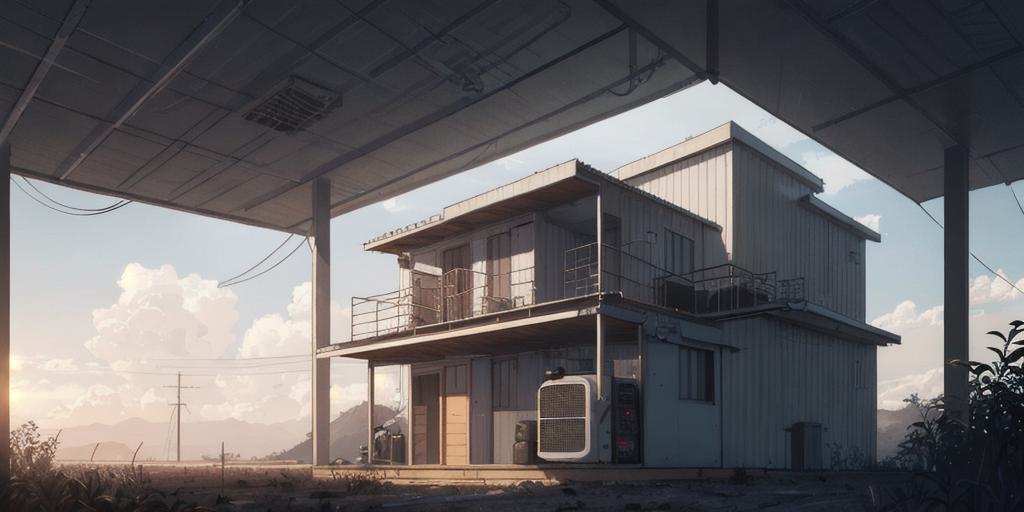
Embracing the Future: The Smart Grid and Your HVAC
Imagine a home that not only shelters and comforts you but also communicates with you, helping optimize your energy usage, save money and reduce your carbon footprint. This isn’t some sci-fi fantasy, it’s the reality of the smart grid and the future of HVAC technology. As the U.S. Department of Energy’s National Renewable Energy Laboratory is exploring, homes of the future will be intelligently connected to the grid, coordinating power usage for optimal efficiency and cost-effectiveness.
Just as online entrepreneurs harness the power of the internet to optimize their businesses, off-grid dwellers can leverage the smart grid to optimize their energy usage. And the beauty of it? This is a future you can start building towards today.
Power in Your Hands: Renewable Energy Systems
The smart grid isn’t just about energy usage, it’s also about energy production. Solar panels, wind turbines, and other renewable energy systems are a huge piece of the puzzle. As this Huffington Post article rightly points out, we need to look at the energy landscape from a bird’s eye view. It’s not just about finding one ‘magic bullet’ solution, but integrating a variety of technologies for a truly sustainable future.
Just as the digital revolution has democratized business, allowing anyone with a laptop to become an entrepreneur, the smart grid revolution is democratizing energy. You don’t have to be a power company to generate power. With solar panels or a wind turbine, you can become a power producer, contributing to the grid and reducing your energy costs.
Efficiency and Intelligence: Smart HVAC Systems
But the true potential of the smart grid lies not just in energy production, but in energy usage. Smart HVAC systems, connected to the smart grid, can optimize your energy usage for maximum efficiency and comfort. As explored in this ACHR News article, smart HVAC systems can provide two streams of value: energy savings and comfort for consumers, and reduced peak loads for utilities.
Just as online entrepreneurs use data to optimize their businesses, off-grid dwellers can use data from their smart HVAC systems to optimize their energy usage. Imagine an air conditioner that learns your cooling preferences, adjusts to weather forecasts, and responds to real-time energy prices for maximum efficiency and comfort. That’s the future of HVAC technology.
So, whether you’re a digital nomad seeking to unplug from the grid or a homesteader seeking to live more sustainably, embracing the smart grid and the future of HVAC technology can help you live more efficiently, comfortably, and sustainably. It’s not just about escaping the 9-5 grind, it’s about embracing a smarter, greener way of life.
Off-grid HVAC Policy and Regulations
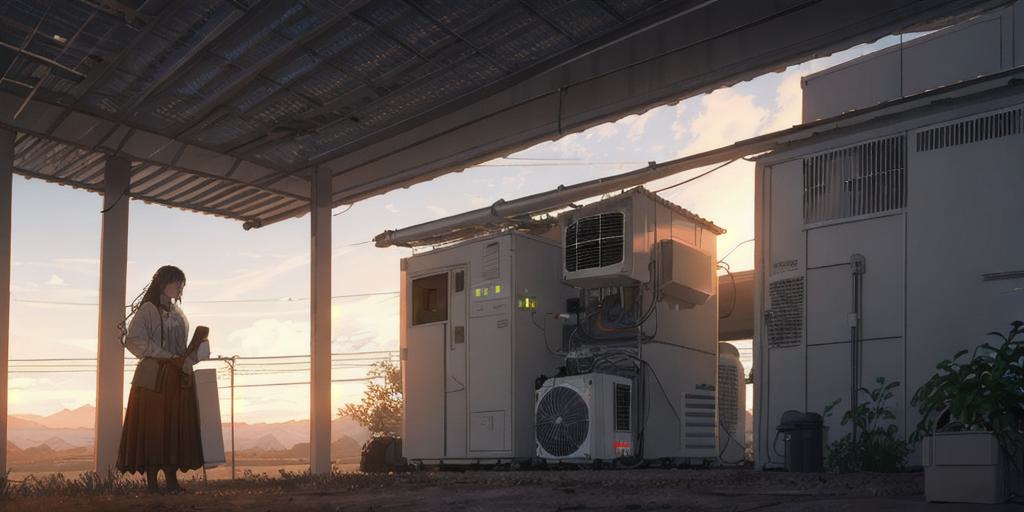
The Regulatory Landscape of Off-grid HVAC
Like a seasoned entrepreneur navigating the intricate labyrinth of online business regulations, individuals seeking an off-grid lifestyle must understand the policy and regulatory landscape surrounding off-grid HVAC systems. It’s not simply a matter of purchasing a solar panel or wind turbine and connecting it to your home. In fact, some states, like Massachusetts, have implemented some of the country’s strictest regulations to encourage energy efficiency by growers. This is particularly relevant for those interested in self-sufficient homesteading, as these regulations directly impact indoor plant cultivation, a cornerstone of many off-grid lifestyles. As reported in this MassLive article, the state has specific lighting requirements for large cultivators, which could influence an off-grid dweller’s choice of renewable energy systems and HVAC solutions.
Going Green While Staying in the Black
Adopting an off-grid lifestyle is not just about minimizing your carbon footprint – it’s also about making savvy financial decisions. Take the example of Solar Therapeutics, a company that’s taking its marijuana cultivation facility completely off the grid. As CEO Edward Dow points out, the upfront costs of building sustainably are recouped through lower energy bills. As detailed in this Loudmouth News article, Solar Therapeutics’ microgrid will generate all the energy required to power its facility, demonstrating that an off-grid lifestyle can be both economically viable and environmentally friendly. This is the kind of innovative, forward-thinking approach that off-grid dwellers must adopt.
Efficiency as a Lifestyle
Living off the grid isn’t just about disconnecting from public utilities – it’s about embracing a new way of life. Just as an online entrepreneur constantly optimizes their business for efficiency and productivity, off-grid dwellers must continuously optimize their energy usage. It’s not enough to simply generate your own power; you must also use it efficiently. From using energy-efficient lights to systems that recapture and reuse water, there are countless ways to maximize efficiency in an off-grid home. As seen in this Home Builder Developer article, companies like Solar Therapeutics are paving the way in this respect, demonstrating that efficiency is not just good for the environment, but also for the bottom line.
Remember, the journey to off-grid living is filled with learning opportunities. By keeping an open mind, continuously seeking out new information, and adopting an innovative mindset, you can turn this journey into an enriching adventure.
A New Dawn: The Off-grid HVAC Revolution
Conceptualize a life where you’re not just a passive consumer of energy, but an active participant in its generation and management. A life that breaks free from the chains of conventional utility services and embraces a sustainable, self-sufficient method of climate control. This is the reality of off-grid HVAC systems – a transformative leap towards a more sustainable future.
Off-grid HVAC systems are not just about heating and cooling your home. They are a tangible expression of your commitment to sustainable living, offering a practical, efficient, and affordable solution. They are about harnessing the power of the sun, wind, and even ice, to fuel your daily existence. The initial investment and lifestyle changes may seem daunting, but the rewards – both monetary and ecological – are significant.
As we continue to evolve, so do our HVAC systems. From the integration of solar panels, wind turbines, and batteries to the advent of smart systems, ice storage air-conditioning, and offshore wind energy integration, the future of off-grid HVAC is a vibrant tapestry of innovative solutions. Each component, whether it’s an off-grid inverter, a battery, or a control system, plays a vital role in this symphony of sustainability.
Designing an off-grid HVAC system is not just a task; it’s a journey of exploration and experimentation. It calls for a deep understanding of its mechanics, a keen eye for detail, and a commitment to continuous learning and adaptation. But the end result is not just a personalized, energy-efficient HVAC system; it’s a lifestyle that reflects your commitment to sustainability and self-sufficiency.
Installing and maintaining an off-grid HVAC system is akin to conducting a symphony. It’s a complex, intricate process that demands patience, expertise, and a keen understanding of the interplay between various components. But the rewards – a comfortable, sustainable living environment and significant energy savings – make this symphony worth orchestrating.
The efficiency of off-grid HVAC systems is not just about cost-effectiveness, it’s about sustainability. By smartly integrating various energy systems and optimizing their usage, we can make the most of our off-grid lifestyle. With the advent of the smart grid and the future of HVAC technology, we are not just passive consumers of energy but active participants in its creation and management.
Off-grid HVAC systems aren’t a one-size-fits-all solution. They require a tailored approach based on the local climate and individual needs. But with the right tools, knowledge, and mindset, off-grid living becomes not just a possibility but a convenient, comfortable, and sustainable way of life.
The future of off-grid HVAC technology is bright, with smart grids, renewable energy systems, and smart HVAC systems leading the charge. By embracing this future, we’re not just creating an energy-efficient HVAC system; we’re crafting a lifestyle that reflects our commitment to sustainability and self-sufficiency.
Like any journey, the path to off-grid living is filled with learning opportunities. By understanding the regulatory landscape, making savvy financial decisions, and embracing a lifestyle of efficiency, you can turn this journey into an enriching adventure. So, whether you’re an aspiring digital nomad or a seasoned homesteader, let the off-grid HVAC revolution be your guide to a smarter, greener way of life.